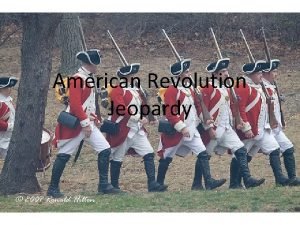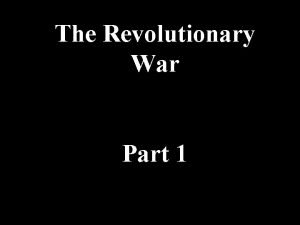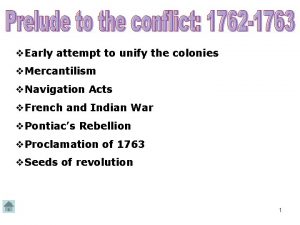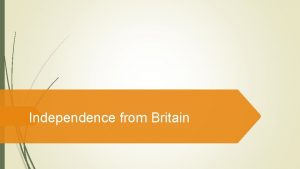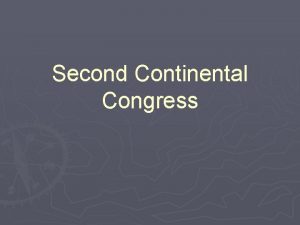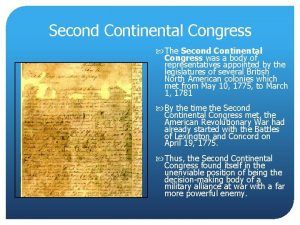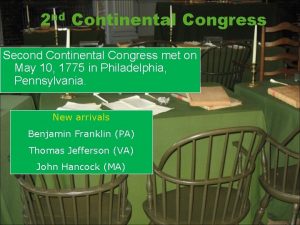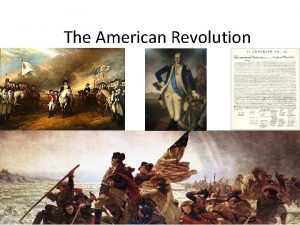First Continental Congress and Lexington and Concord A









- Slides: 9

First Continental Congress and Lexington and Concord

• A few British leaders worried the Intolerable Acts would push the colonies into rebellion. George III was sure they would force the colonists to give in to British authority. • The colonists united over the Intolerable Acts. Boston patriots declared that they would not pay one penny toward the lost tea. Merchants in other cities closed their shops to show their support of Massachusetts. Many colonies sent food and money to Boston so that its citizens would not starve. • In Virginia, lawmakers drafted a resolution in support of Massachusetts because they believed everyone’s rights were at stake. The Virginians also called for a congress of delegates from all the colonies. The purpose would be to find a peaceful solution to the conflicts with Great Britain. • Not all Americans agreed with this plan. In every colony,

The First Continental Congress • In September 1774 the First Continental Congress met in Philadelphia. • The Congress had 56 delegates from each of the colonies except Georgia. • The delegates at the meeting debated the best way to respond to the crisis taking place in Boston. • Some delegates felt that it would be best to make peace with Great Britain. Others, like Patrick Henry, felt that there was no way to avoid a conflict.

• In the end, a compromise was reached. It was agreed that the colonists would continue to boycott British goods, but they warned the colonial militias to be prepared to fight. • They also prepared a list of 10 resolutions to present to King George III. This Declaration of Rights listed freedoms that the delegates believed colonists should possess. • The delegates agreed to meet in May 1775 if the King did not agree.

Patriot or Loyalist? • Patriots believed that • Loyalists were loyal to British taxes, laws and King George III and policies had become Great Britain. They oppressive. Most believed that they important, they prospered as a colony believed the time had of Great Britain. come to resist British policy by force of arms.

Minutemen • In New England the men began arming themselves. They were called Minutemen because they could be ready to fight in a minute. Some practiced fighting and marching with wooden guns. Others had real guns.

The Road to Revolution • On April 18, 1775 the British commander in Boston sent soldiers to Concord to find guns and powder. • They were also ordered to arrest Samuel Adams and John Hancock who were hiding in Lexington. • Paul Revere made his famous midnight ride from Boston to Lexington, Massachusetts to warn the citizens that the British army was on its way. • Revere was captured, but he escaped safely.

Lexington & Concord • The next day the battle of Lexington and Concord took place. The first shot fired was later known as "The shot heard 'round the World" because to the impact of the war that followed.

• Fewer than 70 minutemen met a much larger force of British soldiers. • The colonial commander shouted, “Don’t fire unless fired upon. If they mean to have a war, let it begin here!” • Suddenly, a shot rang out. No one knows who fired this “shot heard round the world. ” • The colonists lost fewer than 100 soldiers, while the British lost 250.
 Chapter 6 section 3 the road to lexington and concord
Chapter 6 section 3 the road to lexington and concord Lexington and concord winner
Lexington and concord winner Battle of lexington and concord
Battle of lexington and concord First shot around the world
First shot around the world Why did the battle of lexington and concord happen
Why did the battle of lexington and concord happen Who won battle of lexington and concord
Who won battle of lexington and concord First continental congress convenes
First continental congress convenes How mercantilism works
How mercantilism works What was the goal of the first continental congress?
What was the goal of the first continental congress? First continental congress convenes
First continental congress convenes





